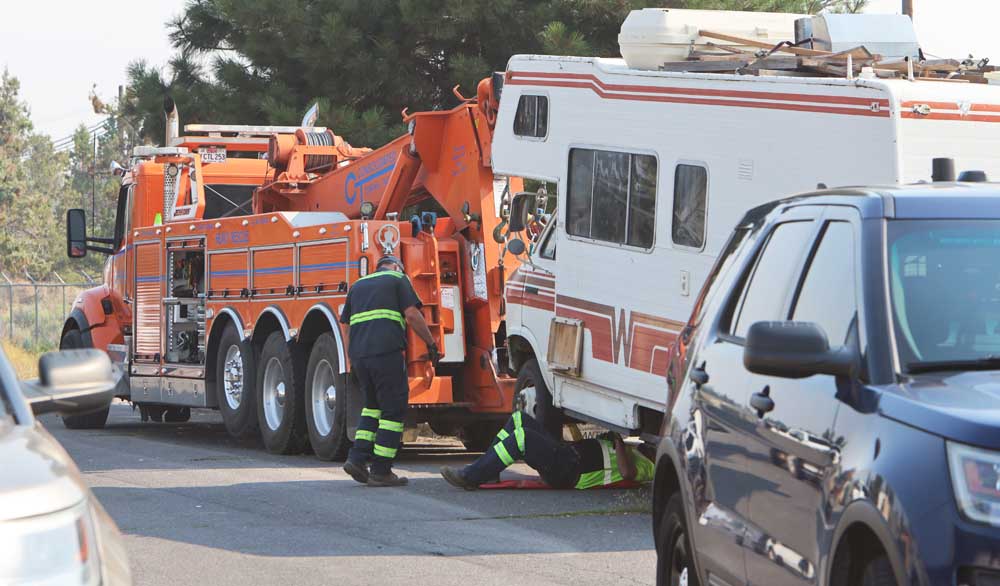Central Oregonians await Supreme Court verdict in Grants Pass homeless case
Published 10:45 am Friday, April 19, 2024

- RVs are towed during a city of Bend sweep of residents living on Hunnell Road in Bend on July 27.
Central Oregon officials will be keeping a watchful eye on the U.S. Supreme Court as it prepares to take up a case from Grants Pass that could determine how governments across the country regulate homelessness.
Regardless of the outcome, the case could have rippling effects, or at least prompt governments to take another look at the rules on the books.
At the heart of Grants Pass v. Johnson is a constitutional question: When governments regulate camping on public property, is it cruel and unusual punishment?
A lower court, the 9th U.S. Circuit Court of Appeals, ruled that Grants Pass’ camping ordinances, which prohibited people from sleeping in public parks and other public places, was cruel and unusual punishment under the Eighth Amendment. Now, the Supreme Court will hear oral arguments in the case, which are set to begin Monday.
Part of the heart of the matter, too, is whether homelessness is conduct or a status, said retired Oregon Supreme Court Justice Jack Landau.
“Grants Pass has pitched this case, though, in a very particular way that appears to be trying to take advantage of a trend in the U.S. Supreme Court cases recently,” Landau said.
Deschutes County earmarks $1.5 million for managed homeless camp
The court has prioritized history and tradition in its interpretation of the Constitution without much care for the practical consequences of its decisions, he said.
With more than two dozen briefs filed from states and organizations across the West Coast and beyond, interest in what the case could mean for governments trying to address homelessness through regulation has crescendoed.
“There are a lot of cities worried about what they can and can’t do,” Landau said.
In the past two years, nearly all of Central Oregon’s major cities have adopted rules for camping on public property. Deschutes County did so, too, in 2023, but those rules didn’t go into effect until March 30, and have yet to be enforced, said David Doyle, the county’s legal counsel. However, the codes and ordinances in Central Oregon are different than the one that landed Grants Pass in the Supreme Court.
Ultimately, Doyle believes the Supreme Court’s decision, which isn’t expected until later this year, will offer clarity.
Doyle is confident in at least two things. One, the court likely won’t overturn the 2018 9th U.S. Circuit Court of Appeals decision, Martin v. Boise, that the Grants Pass case has built upon. The Boise decision said governments cannot criminalize homelessness. Two, he believes the court’s decision could shift the authority to decide where people can camp on public property to governments.
“I think the real issue is who’s going to call the shots,” Doyle said. “Right now, at least in the 9th Circuit, it’s the homeless population that makes that decision.”
Deschutes County is at a significant crossroads. Officials have made plans to move people off of county-owned land near Bend and Redmond but have been hamstrung by the pending Supreme Court case.
“It’s very real to us,” Doyle said. “We’re dealing with it at every level.”
Oregon’s homeless population has steadily risen in recent years. Central Oregon is no exception with nearly 2,000 people experiencing homelessness, according to a count conducted in January. A lack of shelter beds and housing options have left camping outdoors — in tents, makeshift shelters and RVs — the most viable option for many people.
In West Coast cities, where homelessness tends to be most prominent, courts have significant oversight in what’s allowed on public property, said Mary Winters, city attorney for Bend.
“That’s a litigious place to be,” she said.
It’s also not a healthy place to be, Winters said.
Bend saw its own lawsuit last summer, when local service providers and a group of people living on city streets challenged the city of Bend’s plans to remove those people in Deschutes County Circuit Court. The city ultimately prevailed, and the ruling from presiding Judge Wells Ashby, which was affirmed by a federal judge, offered some clarity on what is and isn’t allowed under the law.
But uncertainty persists as people await the Grants Pass outcome. For Doyle, whatever the justices decide, it is an opportunity to have a common structure for how to address homelessness.
He added: “Not just managing it, but improving it and figuring out how to fix the issue.”








